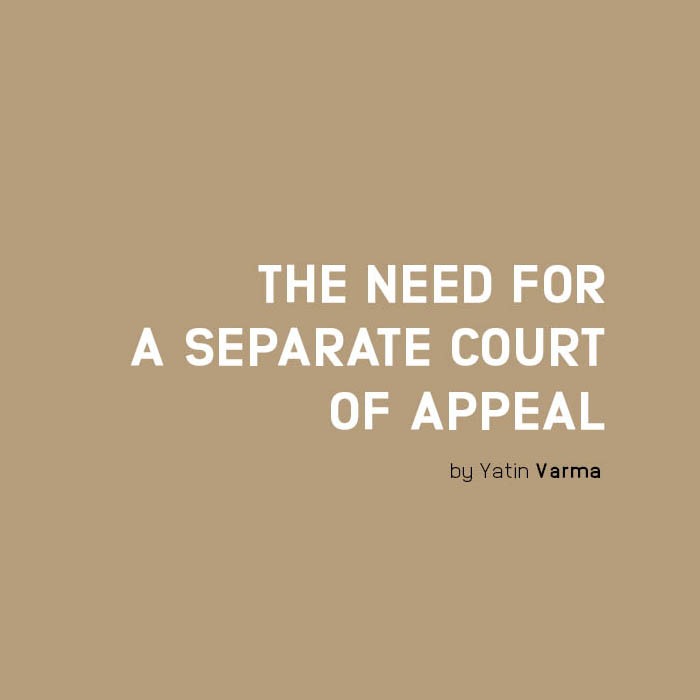Section 80(3) of the Constitution provides: The Judges of the Court of Civil Appeal and Court of Criminal Appeal shall be the Judges for the time being of the Supreme Court. Back in 1968, the framers of our Constitution made a temporary provision for the judges of the Supreme Court to also hear appeals. It is unfortunate that after fifty years, the temporary set up intended by this provision has somewhat become a permanent feature. It is unconceivable, to say the least, that a judge is expected to sit with another judge to hear a case and the next day either of them may be called upon to hear an appeal against the judgment of the other. This state of affairs is unhealthy for our judiciary, a pillar for our democracy, and cannot be allowed to persist.
The report of the Presidential Commission, chaired by Lord Mackay, to examine and report upon the structure and operation of the judicial system and legal profession of Mauritius, was made public in 1997.
As regards the Supreme Court, the Commission recommended, inter alia, the following at Chapter 3:
- ……it would be right to divide the Supreme Court into two sections, a Court of Appeal Section and High Court Section, in order that the judges exercising the appeal jurisdiction should be freed from detailed consideration of cases at first instance so that they may concentrate on the development of the law and have appropriate opportunity to consider the way that other jurisdictions have developed their law to deal with problems similar to those which arise in Mauritius;
- ……it would be right to set up a Court of Appeal Section of the Supreme Court to which appeals from every level of court in Mauritius, the High Court Section of the Supreme Court, the Intermediate Court and the District Court should be taken. This Court of Appeal Section should also be the Court to which appeals from the Industrial Court or any tribunal in respect of which an appeal lies should be taken;
- …..recommend that the new Court of Appeal Section should consist of the Chief Justice, who will continue to be the Head of the Judiciary, the President of the Supreme Court and the Court of Appeal Section of that Court. The other judges should be the Senior Puisne Judge and the three most senior judges of the present Supreme Court.
At some point, resistance was shown against the reform on the basis of the argument that judges will lose their acquired right to hear appeals. This does not, in any way, hold water as the Commission recommended at paragraph 3.5 of the report: …….. any judge or more might be called upon from time to time, at the discretion of the Chief Justice, to serve on an appeal, unlike the Chief Justice himself and the Senior Puisne Judge who are expressly called to sit on the Court of Civil Appeal and the Court of Criminal Appeal. The other judges individually are not nominated under the present law as having any specific appellate function and therefore we consider that there is no valid objection that can be offered to making this separation between the appellate and the first instance function, which we consider is now wise to make, in the interest of the development of the law of Mauritius and the reputation of its Courts.
The new Supreme Court building is a reality. It was recommended at paragraph 3.4 of the report: …… the perception of the Court of Appeal Section as a distinct court would be enhanced if it sat in a distinct building from other courts. The old Supreme Court building can be used to house the Court of Appeal Section and the new, the High Court section.
In 2010, two draft Bills namely the Constitution (Amendment) Bill and the Judicial and Legal Provision Bill, intended to implement the above recommendations, were circulated for public consultation. Working sessions were held with the judiciary and recommendations were received from the Bar Council, the Law Society, the Chamber of Notaries, the Law Reform Commission and the Office of the Director of Public Prosecutions. In 2013, both Bills were ready to be introduced in the National Assembly and the Judicial and Legal Provisions Bill had even received Cabinet approval. On 23rd June 2021, pursuant to section 3(2)(b) & (c) of the Mauritius Bar Association Act, the Bar Council made representations to Government with a view to set up a Court of Appeal separate from the Supreme Court. On 29th July, 2021, Government responded to inform the Council that the suggestion is being considered.
The setting up of a separate Court of Appeal will, undoubtedly, receive support from most parties across the political spectrum and remain a landmark in making our democracy more vibrant.


Leave a Reply